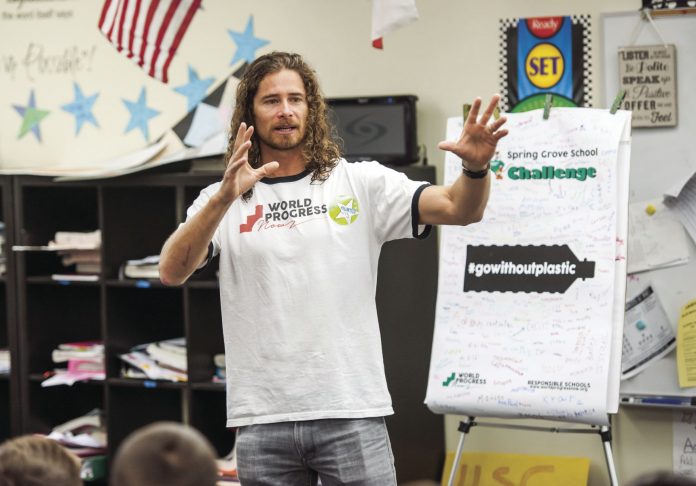
As Alec and Nicole Griffin wrapped up their presentation, they asked the fifth graders at Spring Grove School a question.
“Raise your hands if you think you can go without plastic,” said Nicole, who is the co-founder along with her husband Alec for World Progress Now, a nonprofit social benefit organization founded on the principle of responsible tourism.
In unison, the majority of the students raised their hands, seemingly eager to tackle the challenge of using as little plastic as possible to help protect the environment. In a lively 30-minute presentation, the Griffins—a married couple of 16 years, Hollister natives and San Benito High graduates—offered relevant information and practical ways to help sustain local economies and protect the environment for the next generation. The couple gave a total of 10 presentations at Spring Grove, hitting up all the different age groups during a two-day stretch in the week of May 27.
They chose Spring Grove in part to recognize the fact that it is one of the few schools in the area that has a hydration system, where students can use their reusable bottles, containers or canteens and fill them up at the hydration system instead of buying multiple bottles of water everyday.
“Spring Grove was a draw to us because it was really progressive for them to have a hydration system,” Nicole said. “They have something that most schools want or can’t afford, or don’t implement or don’t think to implement.”
The Griffins offered the kids practical ways they could make a difference, some of which include using reusable containers instead of zip-lock bags and carrying around biodegradable bags instead of plastic bags.
“Biodegradable bags are made of corn, so when they’re eventually taken to a landfill or compost, it disintegrates really fast,” said Alec, a former Spring Grove student. “And it doesn’t pollute the environment (like plastic will) … Up until five to six years ago, I was using plastic water bottles. In part because I was told the same things that tap water is no good for you. Our campaign is to go without plastic and make known the environmental and health effects that plastic has on the environment.”
The Griffins explained that plastic is made from oil, and that only one of every five water bottles is actually fully recycled.
“The other four are recycled into something else,” Alec said. “They end up in rivers, lakes, oceans, in the garbage, which goes to a landfill. Plastic is forever—it doesn’t go away.”
Alec said that once plastic is broken down into little pieces, birds and fish think it’s plankton or krill and eat them. This has severe consequences, of course, as the animals can die from plastic ingestion. It’s well documented that there is a floating garbage patch in the Pacific Ocean that is the size of Texas. The Griffins lived in Seoul, South Korea from 2011 to 2014, working as teachers at an international school.
During their time there, the Griffins traveled to places like Thailand, Cambodia, Bali and the Philippines. At all of the locations, they noticed a disturbing trend: the countries were littered with trash and waste, with tourists contributing heavily to the cause.
Tourists like the Griffins.
“We were part of the problem,” Alec said. “And now we want to be a part of the solution.”
“The countries couldn’t keep up with the trash the tourists would produce,” Nicole said. “We realized they didn’t have recycling there and didn’t know what to do with it (all of the trash, plastic and waste), so it would just go in rivers. We love traveling and being tourists, but that’s not always a good thing. We want to make sure people are aware on how to be responsible tourists, and not go through a culture and destroy it.”
World Progress Now’s vision is to protect local environments, economies and cultures from the negative impacts of tourism, among other things. The Griffins are perfect partners in tackling environmental issues. They both got their master’s degrees in policy and tourism at Cal State University Monterey Bay, where they ended up working on projects together.
Now they’re looking to grow the organization so it can have a positive impact throughout the nation, and eventually worldwide. Once Alec and Nicole laid out their vision, they received tremendous help from Nicole’s aunt and uncle.
“We’ve been able to save a lot of money in the last two years living with my uncle and aunt in Sonoma,” Nicole said. “We’ve been helping them start a winery, so that’s been our income a little bit. If it wasn’t for them, we wouldn’t have been able to start this whole thing because they’ve given us a place to stay, helped us along the way and gave us the time we needed to put it all together.”
Now that World Progress Now—its headquarters is located in Santa Rosa—has achieved nonprofit status, the Griffins have a clear picture on their future goals. That includes applying for grants and fundraising so they can get enough money to allow them to go to schools that don’t have hydration systems.
“We want to build a responsible school infrastructure,” Alec said. “The infrastructure is what we care about.”
And that starts with the placement of hydration systems in public spaces. Through education, action and awareness, World Progress Now strives to end the world’s dependence on disposable plastic.
“The passion is not out of guilt or shame, but out of being an educator,” Alec said. “We want to further the cause and clean up the planet.”









